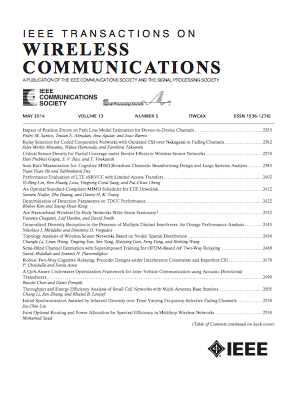Convergence Analysis and Energy Minimization for Reconfigurable Intelligent Surface-Assisted Federated Learning
IF 8.9
1区 计算机科学
Q1 ENGINEERING, ELECTRICAL & ELECTRONIC
引用次数: 0
Abstract
This paper considers reconfigurable intelligent surface (RIS)-enabled federated learning (FL) system, where the FL users communicate with the access point (AP) via RIS. To reveal the impact of RIS and learning rate on FL aggregation, the theoretical result of minimum global communication rounds and local iteration rounds are derived. Based on the obtained convergence results of FL, we formulate an optimization problem to minimize the energy consumption of the proposed RIS-assisted FL system by jointly optimizing the passive beamforming of RIS, the CPU computing frequency, the bandwidth, and the transmit power of users. To solve the non-convex problem, we propose a block coordinate descent (BCD) optimization algorithm based on successive convex approximation (SCA) to decompose the original problem into four sub-problems. Specifically, the closed-form solutions are derived for the CPU frequency, RIS reflection matrix, and communication bandwidth. For the transmit power sub-problem, we propose a linear approximation algorithm based on the first-order Taylor expansion to ensure solution accuracy. Finally, simulation results show that: 1) the energy consumption of the proposed RIS-assisted FL system can be greatly reduced compared to that without optimizing the passive beamforming of RIS and the transmit power; 2) The learning performance of the proposed RIS-enabled FL system is closed to the FL without wireless communication interference; and 3) The proposed algorithm can not only significantly reduce energy consumption, but also fast convergence in terms of the FL model training and testing.可重构智能表面辅助联合学习的收敛分析和能量最小化
本文研究了可重构智能表面(RIS)支持的联合学习(FL)系统,FL 用户通过 RIS 与接入点(AP)通信。为了揭示 RIS 和学习率对 FL 聚合的影响,推导了最小全局通信轮数和局部迭代轮数的理论结果。根据 FL 的收敛结果,我们提出了一个优化问题,通过联合优化 RIS 的无源波束成形、CPU 运算频率、带宽和用户发射功率,使拟议的 RIS 辅助 FL 系统的能耗最小。为了解决非凸问题,我们提出了一种基于逐次凸逼近(SCA)的块坐标下降(BCD)优化算法,将原始问题分解为四个子问题。具体来说,我们得出了 CPU 频率、RIS 反射矩阵和通信带宽的闭式解。对于发射功率子问题,我们提出了一种基于一阶泰勒展开的线性近似算法,以确保求解的准确性。最后,仿真结果表明1)与不优化 RIS 的无源波束成形和发射功率的情况相比,所提出的 RIS 辅助 FL 系统的能耗可以大大降低;2)所提出的 RIS 辅助 FL 系统的学习性能接近于无无线通信干扰的 FL;3)所提出的算法不仅可以显著降低能耗,而且在 FL 模型训练和测试方面可以快速收敛。
本文章由计算机程序翻译,如有差异,请以英文原文为准。
求助全文
约1分钟内获得全文
求助全文
来源期刊
CiteScore
18.60
自引率
10.60%
发文量
708
审稿时长
5.6 months
期刊介绍:
The IEEE Transactions on Wireless Communications is a prestigious publication that showcases cutting-edge advancements in wireless communications. It welcomes both theoretical and practical contributions in various areas. The scope of the Transactions encompasses a wide range of topics, including modulation and coding, detection and estimation, propagation and channel characterization, and diversity techniques. The journal also emphasizes the physical and link layer communication aspects of network architectures and protocols.
The journal is open to papers on specific topics or non-traditional topics related to specific application areas. This includes simulation tools and methodologies, orthogonal frequency division multiplexing, MIMO systems, and wireless over optical technologies.
Overall, the IEEE Transactions on Wireless Communications serves as a platform for high-quality manuscripts that push the boundaries of wireless communications and contribute to advancements in the field.

 求助内容:
求助内容: 应助结果提醒方式:
应助结果提醒方式:


